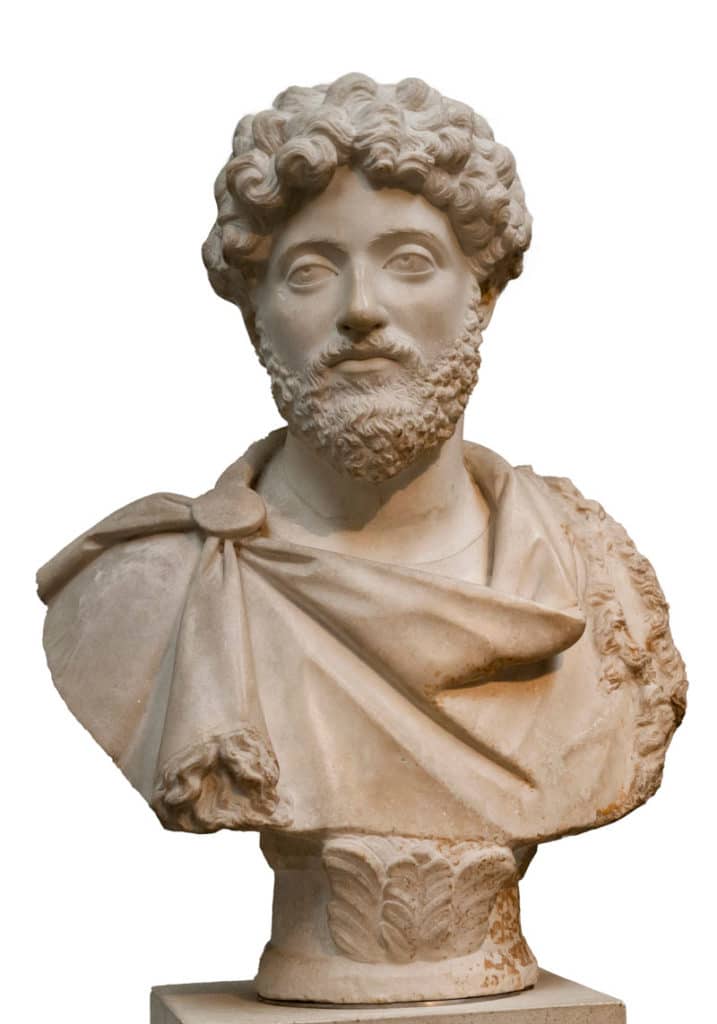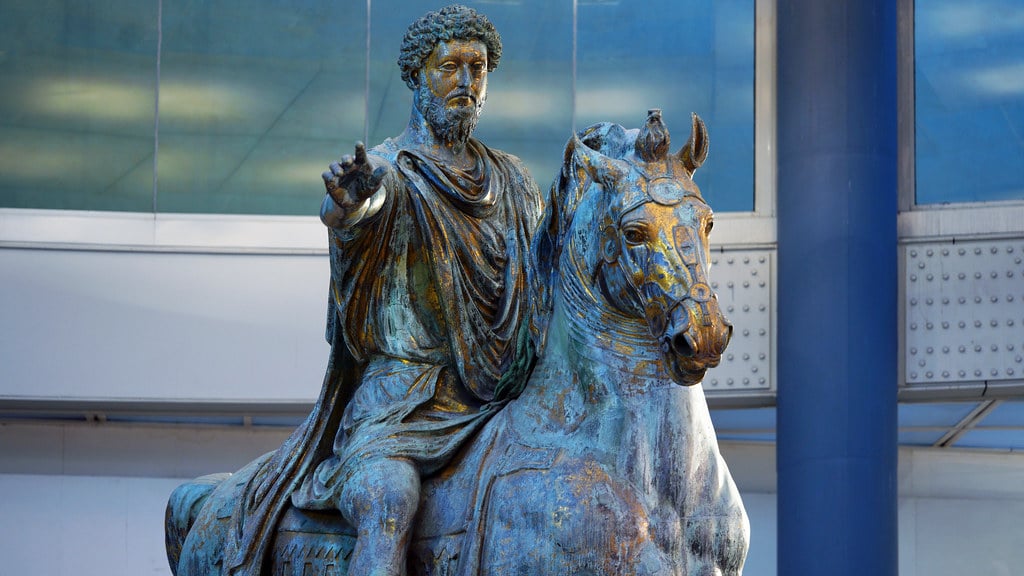Life: AD 121 – 180

- Name: Marcus Annius Verus
- Born on 26 April AD 121at Rome.
- Consul AD 140, 145, 161.
- Became co-emperor on 7 March AD 161.
- Wife: Annia Galeria Faustina ‘the younger’ (eight sons; Titus Aurelius Antoninus, Titus Aelius Aurelius, Titus Aelius Antoninus, unknown, Titus Aurelius Fulvus Antoninus, Lucius Aurelius Commodus, Marcus Annius Averus, Hadrianus; 6 daughters; Domitia Faustina, Annia Aurelia Galeria Lucilla, Annia Aurelia Galeria Faustina, Fadilla, Cornificia, Vibia Aurelia Sabina).
- Died near Sirmium, 17 March AD 180.
Early Life of Marcus Aurelius
Marcus Annius Verus was born in Rome on 26 April AD 121.
His paternal great-grandfather, Annius Verus from Uccubi (near Corduba) in Baetica, had brought the family, wealthy through the production of olive oil, to prominence by gaining the rank of senator and praetor.
After this, his paternal grandfather (also Marcus Annius Verus) held the office of consul three times. It was this grandfather who adopted Marcus Aurelius after his father’s death and at whose grand residence the young Marcus grew up.
His father, also called Marcus Annius Verus, married Domitia Lucilla, who came from a wealthy family that owned a tile factory (which Marcus would inherit) close to Rome. But he would die young when his son was only about three years old.
Early on in his life, Marcus had the additional name ‘Catilius Severus’ to his name. This was in honor of his maternal step-grandfather, who had been consul in AD 110 and 120. To complete the picture of Marcus’ family ties, one needs also to mention his paternal aunt, Annia Galeria Faustina (Faustina the Elder), who was the wife of Antoninus Pius. No emperor since Tiberius had spent such a long time preparing and waiting to accede to the throne as Marcus Aurelius.

It remains unknown just how it was that the young boy Marcus so early in his life attracted the attention of Hadrian, who affectionately nicknamed him ‘Verissimus’, enrolled him to equestrian rank at the age of only six, made him a priest of the Salian order at the age of eight and had him educated by the best teachers of the day.
Then, in AD 136, Marcus was betrothed to Ceionia Fabia, the daughter of Lucius Ceionius Commodus, by the wish of emperor Hadrian. Shortly after this, Hadrian announced Commodus as his official heir. As son-in-law to the imperial heir, Marcus now found himself at the very highest level of Roman political life. Though Commodus was not to be heir apparent for long, he died on 1 January AD 138.
Hadrian’s Choice
Hadrian thought he needed an heir, for he was growing old, and his health was beginning to fail him. He clearly appeared to like the idea of seeing Marcus on the throne one day but knew he was not old enough. And so Antoninus Pius became the successor, but only by and in turn adopting Marcus and Commodus’ orphaned son, Lucius Ceionius Commodus, as his heirs.
Marcus was 16 when the adoption ceremony took place on 25 February AD 138. It was on this occasion that he assumed the name Marcus Aurelius. The accession to the throne of the joint emperors was to set a precedent that should be repeated many times in the coming centuries.
As Hadrian died shortly after and Antoninus Pius assumed the throne, Marcus soon shared in the work of the high office. Antoninus sought Marcus to gain experience for the role he would one day have to play. And with time, both seemed to have shared genuine sympathy and affection for each other, like father and son. As these bonds grew stronger, Marcus Aurelius broke off his engagement to Ceionia Fabia and instead became engaged to Antoninus’ daughter Annia Galeria Faustina (Faustina the Younger)in AD 139. Faustina would bear him no fewer than 14 children during their 31 years of marriage. But only one son and four daughters were to outlive their father.
Becoming a Caesar!
In AD 139, Marcus Aurelius was officially made Caesar, junior emperor to Antoninus, and in AD 140, at the age of only 18, he was made consul for the first time.
Just as there was no doubt whom of his two adopted sons Antoninus favored, it was clear that the senate, too, preferred Marcus Aurelius. When, in AD 161, Antoninus Pius died, the senate sought to make Marcus the sole emperor. It was only due to Marcus Aurelius’ insistence, reminding the senators of the wills of both Hadrian and Antoninus, that his adoptive brother Verus was made his imperial colleague.
Military Campaign, Rebellions, and Plague
Had the rule of Antoninus Pius been a period of reasonable calm, the reign of Marcus Aurelius would have been a time of almost continuous fighting, made yet worse by rebellions and plague. When in AD 161, war broke out with the Parthians, and Rome suffered setbacks in Syria, it was emperor Verus who left for the east in order to lead the campaign. And yet, as Verus spent most of his time pursuing his pleasures at Antioch, the leadership of the campaign was left in the hands of the Roman generals and – to some degree – even in the hands of Marcus Aurelius back in Rome.
As if it were not enough trouble that, when Verus returned in AD 166, his troops brought with them a devastating plague that racked the empire, then the northern frontiers should also see successive attacks across the Danube by ever more hostile Germanic tribes.
By autumn AD 167, the two emperors set out together, leading an army northward. But only on hearing of their coming, the barbarians withdrew, with the imperial army still in Italy. Marcus Aurelius, though, deemed it necessary for Rome to reassert its authority to the north. The barbarians should not grow confident that they could attack the empire and withdraw as they pleased.
And so, with a reluctant co-emperor Verus, he set out for the north for a show of strength. When they returned to Aquileia in northern Italy, plague ravaged the army camp, and the two emperors decided it wiser to head for Rome. But emperor Verus, perhaps affected by the disease, never made it back to Rome. He died only after a short while into the journey at Altinum (early AD 169).
This left Marcus Aurelius the sole emperor of the Roman world.
Ruling Alone
But already in late AD 169, the very same Germanic tribes that had caused the trouble that had taken Marcus Aurelius and Verus over the Alps launched their biggest assault across the Danube. The combined tribes of Quadi and Marcomanni broke through the Roman defenses, crossed the mountains into Italy, and even laid siege to Aquileia.
Meanwhile, further east, the tribe of the Costoboci crossed the Danube and drove south into Greece. Marcus Aurelius, his armies enfeebled by the plague gripping his empire, had great trouble re-establishing control. It was only achieved in an arduous, embittered campaign lasting for years. Harsh conditions only further strained his forces. One battle took place in the deepest winter on the frozen surface of the river Danube.
Throughout these gruesome wars, Marcus Aurelius still found the time for governmental affairs. He administered government, dictated letters, and heard court cases in an exemplary fashion, with a remarkable sense of duty. He is said to have spent up to eleven to twelve days on a difficult court case, at times even dispensing justice at night.
If Marcus Aurelius’ reign was to be one of almost constant warfare, then it stands in stark contrast to his being a deeply intellectual man of a peaceful nature. He was an ardent student of Greek ‘stoic’ philosophy, and his rule is perhaps the closest to that of a true philosopher king the Western world ever came to know. His work ‘Meditations’, an intimate collection of his profound thoughts, is perhaps the most famous book ever written by a monarch.
Marcus Aurelius’s look on Christianity
But if Marcus Aurelius was a profound and peaceful intellect, then he bore little sympathy for followers of the Christian faith. To the emperor, Christians seemed mere fanatical martyrs who stubbornly refused to have any part in the greater community, which was the Roman Empire. If Marcus Aurelius saw in his empire the union of the people of the civilized world, then the Christians were dangerous extremists who sought to undermine this union for the sake of their own religious beliefs. For such people, Marcus Aurelius had no time and no sympathy. The Christians were persecuted in Gaul during his reign.
False Rumor that Almost Led to Civil War
In AD 175, yet another tragedy occurred to an emperor so haunted by bad fortune. As Marcus Aurelius fell ill when fighting on the campaign on the Danube, a false rumor appeared to have emerged, which announced he was dead. Marcus Cassius, the governor of Syria who had been appointed to the command of the east of the empire, was hailed emperor by his troops. Cassius was a loyal general to Marcus Aurelius. It is very unlikely that he would have acted if he had not thought the emperor dead. However, it is likely that the prospect of Marcus’ son Commodus taking the throne might have spurned Cassius on to act quickly at hearing of the throne having fallen vacant.
It is also believed that Cassius enjoyed the support of the empress, Faustina the Younger, who was with Marcus’ but feared him dying from illness. But with Cassius hailed emperor in the east and Marcus Aurelius still alive, there was no going back. Cassius now couldn’t simply resign. Marcus prepared to move east to defeat the usurper, but shortly after, news reached him that Cassius had been killed by his own soldiers.
The emperor, aware of the misunderstanding that had led to Cassius’ unwitting revolt, did not begin a witch hunt to seek out any conspirators. Perhaps because he knew of his wife’s own support of Cassius in this tragedy. In order to avert any future chance of civil war, should rumors of his death arise again, he now (AD 177) made his son Commodus his co-emperor.
Commodus had already held the position of Caesar (junior emperor) since AD 166, but now his status of co-Augustus made his succession inevitable. Then, with Commodus alongside him, Marcus Aurelius toured the east of the empire, where Cassius’s revolt had arisen. The wars along the Danube, however, were not at an end. In AD 178, Marcus Aurelius and Commodus left for the north, where Commodus would play a prominent role alongside his father in leading the troops.
Dying from a long-lasting Illness
If the fortunes of war were with the Romans this time and the Quadi were seriously mauled in their own territory beyond the Danube (AD 180), then any joy was offset by the old emperor now being seriously ill. A long-lasting illness – he had for some years complained of stomach and chest pains – finally overcame the emperor, and Marcus Aurelius died on 17 March AD 180 near Sirmium.

His body was laid to rest in the Mausoleum of Hadrian.
People Also Ask:
What is Marcus Aurelius most famous for?
What were Marcus Aurelius accomplishments? Marcus Aurelius wrote an influential piece of philosophic writings known as the Meditations. He also held together the Roman Empire through two long wars and a plague.
Was Marcus Aurelius a good or bad Roman emperor?
Marcus Aurelius reigned from 161-180 CE. History portrays him as the last of the Five Good Emperors. Through his conquests, he brought the empire to its height of prosperity while defeating invaders. He was also one of the most famous Stoic philosophers and contributed much to the field of Roman philosophy.
Was Marcus Aurelius a Stoicism?
According to tradition, Marcus was a Stoic. His ancient biographer, Julius Capitolinus, describes him as such. Marcus also makes reference to a number of Stoics by whom he was taught and, in particular, mentions Rusticus from whom he borrowed a copy of the works of the Stoic philosopher Epictetus (Med. 1.7).
What religion is closest to Stoicism?
This way of thinking is very similar to Buddhism, which places great emphasis on the impermanent aspect of human life and the transitory nature of existence. The impermanence of everything is the main reason why desire is the cause of all suffering.

Historian Franco Cavazzi dedicated hundreds of hours of his life to creating this website, roman-empire.net as a trove of educational material on this fascinating period of history. His work has been cited in a number of textbooks on the Roman Empire and mentioned on numerous publications such as the New York Times, PBS, The Guardian, and many more.

